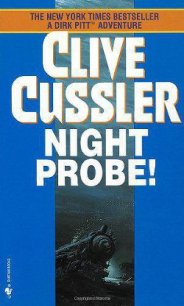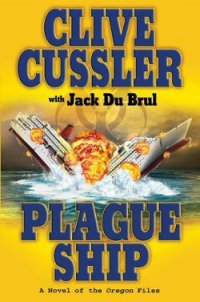Flood Tide - Cussler Clive (читать книги без txt) 📗
His team of twenty men had converged on the cabin along the road and through the forest after his advance scout radioed that he had shot holes in the radiator of the occupant's car. Kung Chong was certain that all paths of escape were cut off and that no one had passed through his cordon. Whoever was living in the cabin had to be there. And yet Kung Chong sensed all was not going according to plan.
Throwing light around a darkened building usually indicated an ambush by people waiting to open fire inside. The brightly lit yard canceled the use of night glasses. But this situation was different. The illuminated interior rooms and the loud music puzzled Kung Chong. Total surprise seemed out of the question. Until his men could gain the relative safety of the cabin walls and break through the doors, they were sitting ducks to anyone with automatic weapons as they rushed across the yard. He moved from position to position around the cabin, peering through the windows with a pair of binoculars, observing a solitary man who sat at a table in the kitchen, the only room unrecorded by interior surveillance cameras. He wore a baseball cap and reading glasses and was bent over the table seemingly reading a book. A cabin ablaze with lights. The radio turned up at full volume. A man fully dressed and reading a book at five-thirty in the morning? Kung Chong sniffed the air and smelled a setup.
He sent for one of his men who carried a sniper rifle with a scope and a long suppressor on the muzzle. “You see the man sitting in the kitchen?” he asked quietly.
The sniper nodded silently.
“Shoot him.”
Anything less than a hundred yards was child's play. A good shot with a handgun could have hit the target. The sniper ignored the scope and sighted in on the man seated at the table with the gun's iron sights. The shot sounded like the quick clap of hands followed by a tinkle of glass. Kung Chong peered through his binoculars. The bullet had made a small hole in the windowpane, but the figure remained upright at the table as if nothing had happened.
“You fool,” he growled. “You failed to hit him.”
The sniper shook his head. “At this distance it is impossible to miss.”
“Shoot again.”
The sniper shrugged, lined up the shot and pulled the trigger. The man at the table remained immobile. “Either the target is already dead or he is in a coma. I struck him above the bridge of the nose. See the hole for yourself.”
Kung Chong focused his glasses on the face of the man in the kitchen. There was a neat round hole above the bridge of the nose above the reading glasses, and it wasn't bleeding.
“Curse that devil!” Kung Chong snarled. No stealth. No orders quietly issued over his radio. He shouted wildly across the clearing in front of the cabin, “Move in! Move in!”
Men dressed in black materialized from the shadows cast by the trees and ran across the yard, past the car and burst through the front door of the cabin. They spread through the rooms like a flood, weapons at the ready, poised to shoot at the first hint of resistance. Kung Chong was the fifth man into the living room. He rushed past his men and burst into the kitchen.
“What manner of devil is he?” Kung Chong muttered as he picked up the dummy sitting in the chair and threw it on the floor. The baseball hat fell away and the reading glasses shattered, revealing a crude face hurriedly molded out of wet newspaper and painted sloppily with vegetable dyes.
Kung Chong's second in command came up to him. “The cabin is empty. No sign of our quarry.”
His lips pressed together in a thin line as he nodded, not surprised by the report. He touched the transmit button on his radio and spoke a name. Lo Han's voice responded immediately.
“Report.”
“He has escaped,” said Kung Chong simply.
There was a moment's pause, then Lo Han said irritably, “How is it possible he sidestepped your men?”
“No one larger than a rat could have slipped through the cordon. He cannot be far away.”
“Most odd. Not in the cabin, not in the forest, where could he have gone?”
Kung Chong stared out the window at the boathouse that was being searched by his men. “The lake,” he answered. “He can only be on the lake.”
He skirted the dummy lying on the floor and ran out the back door across the porch and onto the dock. He shoved aside his men and stepped inside the boathouse. The sailboat was hanging in its cradle, the kayaks and canoe still in their wall racks. He stood numb, aware of the enormity of his blunder, the incredible ease with which he had been deceived. He should have known, at least guessed, how the man in the cabin had slipped through his fingers.
The old boat, the Chris-Craft runabout that Kung Chong had observed earlier after a personal search of the cabin and boathouse, was missing.
Nearly two miles away, it was a sight to stir the blood of those fortunate people who lived in the past. The beautifully designed mahogany hull, contoured in what old-timers called a tumble-home stern, curved gracefully from the transom forward to the engine compartment, which sat between the forward and aft cockpits. Weighted down with twelve adults and two children packed into its dual cockpits, the sixty-seven-year-old 125-horsepower Chrysler marine engine lifted the bow and thrust the boat over the water at nearly thirty miles an hour, casting twin sheets of water to the sides and leaving a rooster tail in her wake. Pitt sat behind the wheel of the Foleys' 1933 Chris-Craft runabout with the little Chinese boy on his lap as the boat planed over the waters of the Orion River toward Grapevine Bay.
After explaining his latest plot to Julia, Pitt had quickly put two of the elderly Chinese men to work siphoning gas out of the car's tank and transferring it into the tank of the runabout. Because the big Chrysler marine engine had not turned over for several months, Pitt also replaced the battery with the one from his car. With Julia Lee translating, he instructed the senior citizens to take the paddles from the kayaks and canoe, and demonstrated the proper method of propelling the runabout without undue splashing noises. Considering the fatigue of the elderly immigrants and drawback of working in the dark, the enterprise went surprisingly smoothly.
Suddenly Pitt turned and rushed out of the boathouse.
“Where are you going?” shouted Julia.
“I almost forgot my best pal,” he yelled back, running across the dock to the cabin. He was back in two minutes with a small bundle under one arm wrapped in a towel.
“That's your best pal?” asked Julia.
“I never leave home without him,” he said.
Without further explanation he began helping everyone in the boat. When the drawn and hollow-eyed immigrants were stuffed into the confined dual cockpits, Pitt opened the boat-house door and whispered the order for everyone to paddle. They had hardly traveled little more than a quarter of a mile, staying along the shoreline in the shadows, when the weary Chinese began giving up from the effects of exposure and exhaustion. Pitt continued stroking until the runabout was at last caught in the current of the river. Only then did he lay his paddle aside and catch his breath for a few moments. Luck was with them; they had yet to be discovered. He waited until they had drifted down the river out of earshot of the lake before he tried to start up the engine. He primed the twin carburetors Foley had installed to update the intake manifold. Then he made a wish on every star in sight and pushed the starter button on the dashboard.
The big, straight-eight Chrysler turned over slowly until the oil circulated, and then increased its revolutions. After grinding away for several seconds, Pitt disengaged the starter. As he primed the carburetors again he could have sworn that everyone in the boat was holding his breath. On the next attempt a pair of cylinders popped to life, then another pair until the engine was hitting on all eight. Pitt pushed the floor lever into forward and let the boat move only on the engine's idle speed. He steered with the little Chinese boy sitting in his lap. Still no shouts from the shore, no searchlight stabbing across the lake. He looked back at the cabin. He could see tiny figures appearing out of the forest and running into the lights he'd left on.




